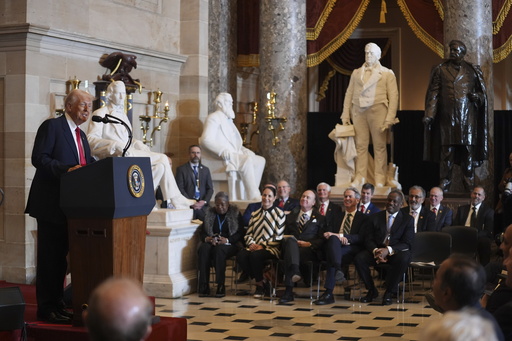A federal judge has issued a ruling preventing President Donald Trump’s initiative to encourage the resignation of federal employees through financial incentives. This decision arrived just before the deadline for workers to apply for what has often been referred to as a buyout program. Following the ruling, Trump’s press secretary criticized some federal workers, alleging that they were attempting to “rip the American people off.”
In recent developments, various groups representing federal workers have filed lawsuits aimed at preventing the Trump administration from what they describe as the “effective dismantling” of the U.S. Agency for International Development (USAID). The American Foreign Service Association, alongside other unions, contends that the Trump administration lacks the legal authority to close down an agency created by Congress. They are requesting a federal court in Washington to mandate the reopening of USAID, the reinstatement of its personnel, and the restoration of funding.
Meanwhile, House Republicans met with Trump at the White House, and Representative Lisa McClain characterized the gathering as a significant step towards solidifying relations, likening the meeting to a date progressing to discussing future plans. Trump was present for parts of the lengthy meeting, during which Republicans worked through their differences over lunch, showcasing a cooperative atmosphere though still facing challenges in agreement.
In related news, Ellen Weintraub, the chair of the Federal Election Commission, took to social media to share a letter from Trump indicating he would be removing her from her role. She stressed that there are legal processes in place for such a change and that she intends to continue her work in service of the American people.
The Senate confirmed Russell Vought as the director of the Office of Management and Budget, a position he is expected to use to advocate for Trump’s expansive policy goals. The confirmation was conducted along party lines, amidst attempts from Democrats to voice their opposition, which were promptly curtailed by the presiding Republican senator.
Further complicating matters, Trump’s so-called “border czar” cited media leaks as a significant factor hampering immigration enforcement operations in Colorado. Amidst ongoing raids targeting gang activities, conflicting reports emerged regarding the number of arrests made during operations aimed at combating criminal elements tied to Tren de Aragua gang.
Additionally, House Speaker Mike Johnson announced a new meeting with Israeli Prime Minister Benjamin Netanyahu after his previous engagement was missed due to scheduling conflicts with other congressional responsibilities.
Trump also made several new diplomatic appointments, nominating individuals for ambassadorships in various countries, which will require Senate approval. Notably, his choice for the U.S. Marshals Service directorship reflects his reliance on experienced law enforcement personnel to oversee federal operations.
A former EPA official criticized the Trump administration for neglecting communities facing severe pollution challenges. This criticism aligns with reports that the administration has sidelined staffing focused on environmental justice, which had been a priority during previous administrations.
Simultaneously, a lawsuit has emerged spotlighting the Trump administration’s efforts to drastically reduce USAID personnel, hiring only a fraction of its previous workforce to continue critical aid programs globally.
Trump has made headlines by imposing sanctions on the International Criminal Court, in response to its investigations into Israel—a close U.S. ally. His executive order specifically penalizes ICC officials, reflecting ongoing tensions surrounding foreign policy matters.
Furthermore, federal judges are now reassessing several initiatives proposed by the Trump administration, including the controversial deferred resignation program designed to reduce the size of the federal workforce, as well as challenges to redefined citizenship policies.
The U.S. Army Corps of Engineers is reportedly resuming permits for renewable energy projects, which had previously been halted due to executive orders affecting the energy sector. Environmental advocates expressed relief that these initiatives will continue, despite Trump’s push for fossil fuel expansion.
Overall, the interplay of legal actions, political maneuvering, and administrative directives illustrates the tumultuous landscape within the federal government under Trump’s ongoing leadership initiatives, amidst rising scrutiny and criticism from various sectors. While workers face uncertainty regarding their futures, the government’s focus shifts towards reshaping its core operations and international engagements.



